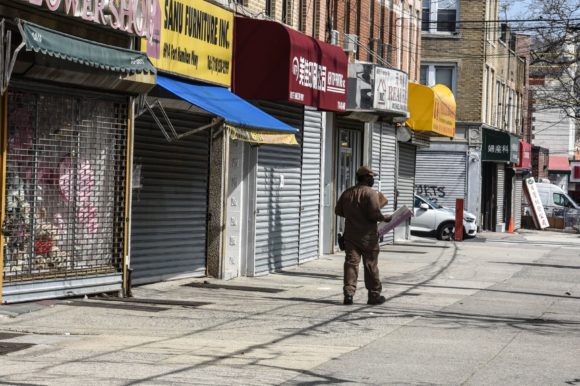Even in the best of the times, not many people are happy to see a process server.
The people who hand-deliver court paperwork — including divorces, evictions, and lawsuits — are accustomed to being threatened and cursed at. Now, they are having to do their inherently face-to-face jobs in a time of social distancing and as civil court cases slow because of the global pandemic.
Process servers, who are typically independent contracts, can make six-figure incomes chasing sometimes reluctant recipients of court filings. While there may be more work in the future, with an expectation that evictions and divorces will pick up in the aftermath of the coronavirus, in the near term, business has been exceptionally bad. One company has seen its revenue drop 98% as courts halt new cases.
“It’s almost a total shutdown,” said Ernest McCoslin, president of the Texas Process Servers Association.
Though the government doesn’t specifically track the number of process servers in the country, a Bureau of Labor Statistics economist in 2012 estimated that as many as 20,000 people worked full- or part-time serving legal papers. States including New York, the hardest hit by the pandemic, have deemed process servers an “essential business,” meaning they’re not subject to business shut-down orders.
In-person court hearings have been suspended in 34 states and the District of Columbia, according to the National Center for State Courts, which is tracking the information. Local courts have the option to close in the other states. Moratoriums on evictions and foreclosures have also been declared in many places.
Eric Vennes, who runs Apex Legal Services outside Seattle, said his company typically served 2,000 legal papers a month, mainly debt collections, before the crisis began. One process server made $120,000 a year, and part-timers made between $40,000 and $65,000. Apex only served 16 notices last month, Vennes said, and he has gone from working with 20 servers to just six or seven.
New Dread
And where there is work, many are now approaching their up-close-and-personal assignments with new dread.
McCoslin said he’s personally unwilling to risk going out in the field now because he’s undergoing chemotherapy. David Brown, a process server and investigator in Western Tennessee, said that, at age 74, he too plans to wait for the pandemic to pass.
Remaining servers are wearing masks, using disinfectant gel and leaving papers on front porches after confirming the intended recipients are home and can see them, rather than delivering them by hand. In some ways, the job has become easier. With stay-at-home orders in place for much of the country, process servers generally don’t face as much hassle finding people as they did before.
But those people may become harder than ever to deal with, says Jillina Kwiatkowski, who owns Smart Serve Process Serving outside Buffalo, New York, and is president of the 2,000-member National Association of Professional Process Servers. She worries that the millions thrown out of work during the crisis will be more highly stressed and more likely to lash out when a process server shows up at their door.
James Burger, a lawyer with the firm White and Williams LLP in New Jersey, said the in-person work of process servers is more important than ever, especially since shuttered businesses might not receive a summons sent in the mail.
‘Critically Important’
“It’s such a fundamental building block of litigation in this country,” said Burger. “Ensuring that a defendant is on notice in a suit is so critically important.”
And there is widespread expectations of a boom once courts resume normal business and are flooded with new and delayed filings, including collections, evictions and bankruptcies.
“This is a recession-proof business,” said Bob Musser, whose Winter Park, Florida, business provides computer software used by process-serving firms. “When things go south, there’s more litigation, there’s more consumer collection.”
For many process servers, that may bring a return to the more familiar risks of the job. Vennes said he was once shot at with a bow and arrow, while Kwiatkowski recalls the time a summons recipient attacked her with a live turkey.
“Those things hurt!” she said.
About the photo: A worker for an independent contractor to United Parcel Service Inc. (UPS) makes deliveries on a street with closed stores in the Borough Park neighborhood in the Brooklyn borough of New York, U.S., on Tuesday, April 7, 2020. Photographer: Stephanie Keith/Bloomberg
Was this article valuable?
Here are more articles you may enjoy.


 UBS Top Executives to Appear at Senate Hearing on Credit Suisse Nazi Accounts
UBS Top Executives to Appear at Senate Hearing on Credit Suisse Nazi Accounts  Hackers Hit Sensitive Targets in 37 Nations in Spying Plot
Hackers Hit Sensitive Targets in 37 Nations in Spying Plot  Navigators Can’t Parse ‘Additional Insured’ Policy Wording in Georgia Explosion Case
Navigators Can’t Parse ‘Additional Insured’ Policy Wording in Georgia Explosion Case  FM Using AI to Elevate Claims to Deliver More Than Just Cost Savings
FM Using AI to Elevate Claims to Deliver More Than Just Cost Savings 